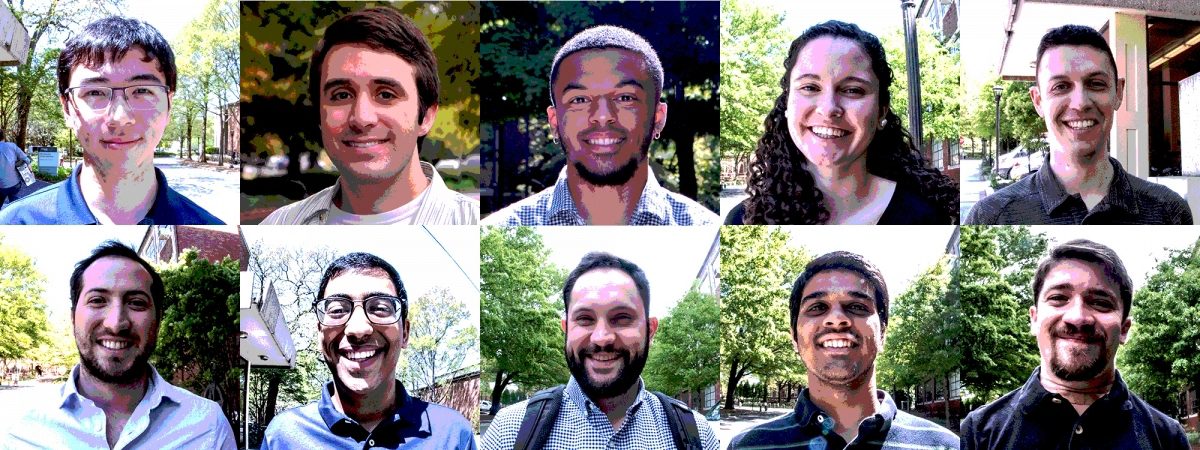
Whether it's a B.S, an M.S., or a Ph.D., the students graduating on May 4 and 5 have some incredible potential ahead of them. We asked a few of them to take a minute to give us a peek at what their next adventure will be.
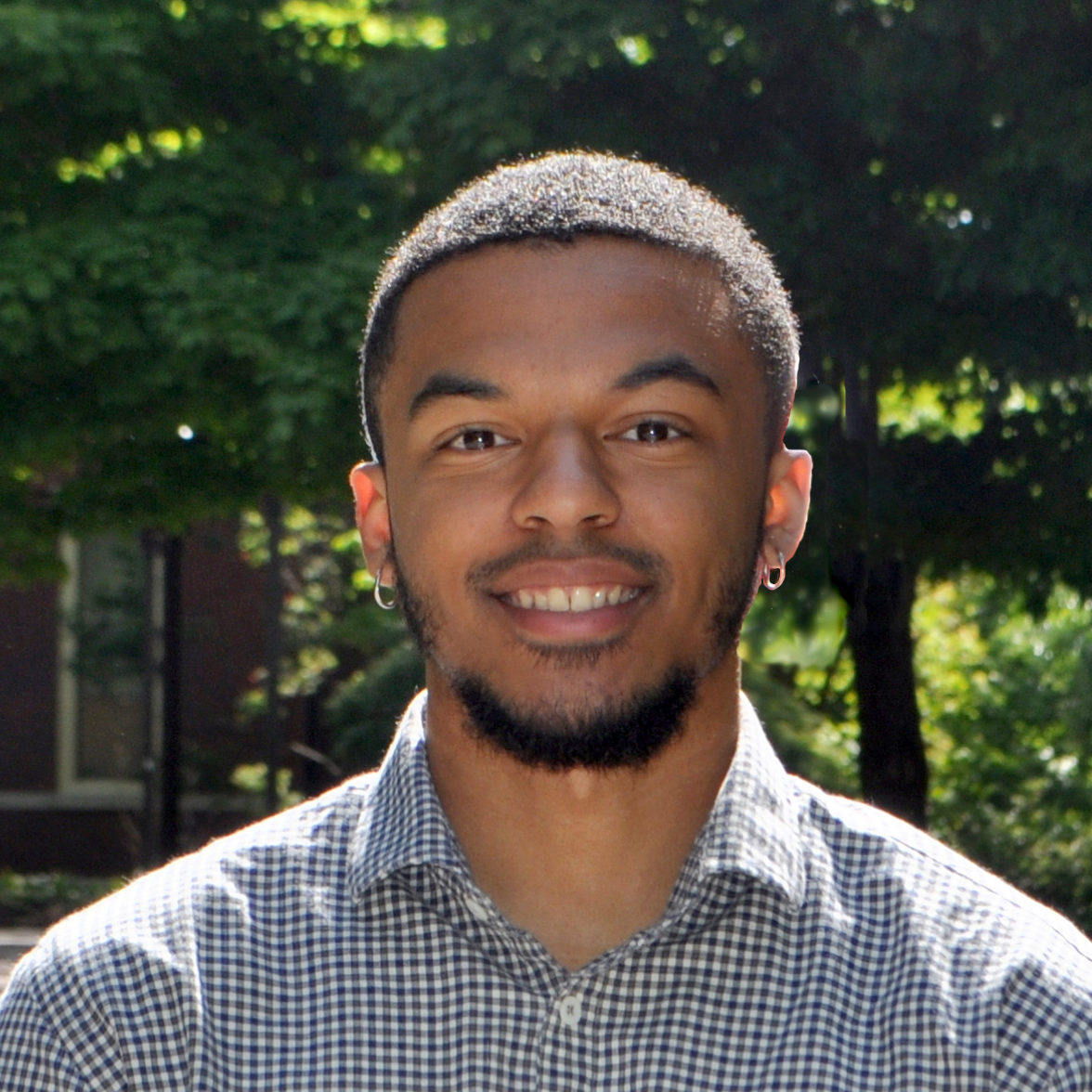 |
| Steven E. Ragland |
Steven E. Ragland, B.S. AE
What is your next adventure?
I am going to Tuscon, Arizona to work as a systems engineer for Raytheon in missile systems. The team I'm working for is the test verification and integration team. Once it's built, we will be the team that tests it to make sure it meets requirements.
What about your next adventure are you most looking forward to?
I am excited about being in a new place. I'm from Houston, so Atlanta was very new when I got here, but now, well, I live here. I know it. I'm looking forward to exploring Tuscon. In a couple of years, I'll probably look into getting an MBA because I think I want to go down the management path in my career, making teams work better. So there's that to be excited about, too.
Did you have any previous co-op, internship, or research experience in this area?
I came to Georgia Tech through the 3-2 program with Morehouse College, so some of my experience came from my time at Morehouse, where I was a physics major. After freshman year, I did a summer internship at NASA in Houston. My team worked with inflatable structures, alternating the string gauge method for measuring strain in textiles. The next two summers, I worked at Northrop Grumman in Redondo Beach, CA, where I did CAD work on actuators in the space program the first year. I did CAD work on the F-35 weapons integration team the second summer. Getting into aerospace was always the plan, so when I got to Tech, I was wondering how to get involved in research -- I knew I wanted to have that under my belt before I left -- and some upper classmen who had that experience suggested I apply to Dr. Walker's lab. I guess he thought my resume was good enough, because he accepted me. Dr. Walker takes pride in quality work, and he expects that from everyone in his lab. My first semester I assisted a customer in managing the labs's vacuum test chamber. The next semester, I wasn't officially in the lab, but I volunteered my time, sometimes, because it was interesting. We were working on building a stand to go into a test chamber to hold a flow meter.
How did your educational experience at Georgia Tech help you to achieve your goal?
Classes I've taken have all led me to a good place. But I didn't necessarily think they were at the time. I actually picked up more in those classes than I thought. And the way I found that out was when I was talking with Ratheon at a campus career information session, I realized I'd already been doing some of the stuff they wanted. The classes I took in systems and controls - and the control lab - they all made a difference.
Another thing that helped me a lot while I was at Tech and at Morehouse was NSBE [National Society of Black Engineers]. I was president of that group at Morehouse and parliamentarian at the Tech chapter, so it was kind of a good bridge. Being around people who had the same interests was great. And it definitely helped me to meet and network and even a few job offers.
What advice would you give to an underclassman who would like to follow the same path?
The 3-2 program was a great decision for me. I was able to start at Morehouse and finish up at Tech. I felt I put a lot of stress on myself to finish up all of my general education requirements while I was at Morehouse, so when I got to Tech, the only classes I could take were aerospace. One thing I would recommend to anyone who also wanted to do this would be to not take so many classes. Spread it out. It's a marathon, so you have to pace yourself. I kept thinking: five years is a lot of time, I better work hard to get through on time. The last two semesters, I took five classes each semester, and that just doesn't give you a lot of time to digest, study, and learn.
Along the way, keep your eyes open for other things, too. I'm always looking for ways to better myself and to increase my net worth. When I was on internships, all of the people around me were working on a higher level degree. I quickly realized that that's what I would need to get a competitive edge. That's why I'll be looking to do an MBA after a couple years of work.
Note: In addition to walking in Georgia Tech's May 5 Commencement ceremony, Steven Ragland will also be invited to walk with his classmates at Morehouse College's May 20 Commencement.
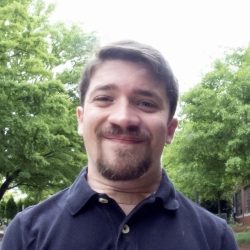 |
| Christopher Cannon |
Christopher Cannon, B.S. AE
What is your next adventure?
In August, I'll move to Seattle to work for Boeing to do model based systems engineering [MBSE] using SysML, a software language that I learned to use in the ASDL.
What about your next adventure are you most looking forward to?
This will be the first time I've flown on a commercial airplane. I've been on a Cessna, but that's it. When I get out there, it'll be a new experience all around, which is a little scary, but I look forward to the challenge. I'm ready to break out the skills and knowledge I gained at Tech and use them. Boeing is helping me re-locate, and a guy I interned with is coming to work for Boeing next February. I'm looking forward to exploring so many new things.
Did you have any previous co-op, internship, or research experience in this area?
Before I transferred into Tech, I did a summer internship at Gulfstream in Savannah. I worked at their Integration Testing Facility as a systems engineer. It was a great experience. My co-workers taught me a lot. About three weeks after I got to Tech, I went to the ASDL where I saw all of their projects on display. I immediately emailed one of the research engineers, Dr. Steven Edwards, and asked if I could work with him. That semester I worked on a team that was exploring the possible use of an open source software, VSP [Virtual Sketch Pad] to simulate the mechanics and propellant tanks of launch vehicles. In the spring of that year, I worked with another research engineer, Russell Peak, to model the relationship between a UAV and an aircraft carrier using MSBE. In the fall, I made the conscious decision to take on a heavy courseload so I audited the research just for fun. No credit, but it was so interesting and I wanted to see the project through.
How did your educational experience at Georgia Tech help you to achieve your goal?
I came to Georgia Tech strictly to study aircraft, but along the way some faculty showed me that space is cool, too. Now I can't choose, and I think that's great. I'll work at Boeing and see where that takes me.
Georgia Tech is so open with students with career guidance and research opportunities. The faculty know the industry and they know what applications are being used. My research faculty gave me the opportunity to explore different sides of engineering. What I learned from this didn't just apply to aerospace engineering. It's systems engineering, which has broad applications. Dr. German taught me so much about fixed wing aircraft. Dr. Lightsey helped me to decide to do what I wanted. He convinced me that if my heart was in the game, I should go for it. If not, you can still gain experience.
One of my goals when I transferred to AE was to get into Sigma Gamma Tau [the AE honor society] and I was able to do that. I also got involved in the student chapter of AIAA, which kept me connected to our profession.
I got a lot of support from the non-aerospace clubs and organizations I joined. Phi Sigma Pi was like my family, and, through them, I took on different roles -- Leadership Chair, Fundraising Chair, Vice President, and even Parliamentarian -- that taught me a lot. I was also a member of Circle K, the collegiate version of the Kiwannis Club, which emphasizes volunteerism. That became a passion. And I was also a member of GT CRU, a Christian fellowship organization that helped me a lot.
What advice would you give to an underclassman who would like to follow the same path?
Definitely don't be afraid to take your time. It's your education and you are the one learning. I made the decision to split my time for different things. Some semesters, I just concentrated more on course work. Other semesters, I did more research. My last semester, I spent time on my clubs and student organizations. They were my support community and I was glad to be involved with them.
The other thing is, don't suffer under the delusion that you are not smart enough. If you got into Tech, you are smart enough. I had to convince myself of this sometimes. Asking others for help made it easier to get there. So don't be afraid to ask for help. It's there.
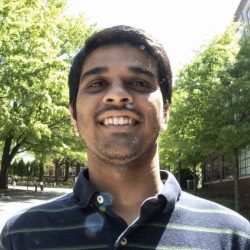 |
| Tejas Puranik |
Tejas Puranik, Ph.D. AE
What is your next adventure?
My family will be visiting from India, so, for the next two months, we'll be traveling around the United States while I do some decompressing. Then I'll start a job here, in Atlanta, at Ernst & Young, as a program portfolio manager.
What about your next adventure are you most looking forward to?
First of all, I'll be traveling and meeting different people, from different places. One of the most exciting things is that I will be applying the knowledge and technical skills I learned at Tech to advise clients on the technologies they should pursue to optimize their projects. To get the most bang for their buck. And I will be consulting with clients from diverse fields - not just aerospace - using advanced problem-solving skills in a new way.
Did you have any previous co-op, internship, or research experience in this area?
I completed two internships as a part of my master's program at Tech. I did two rotations at Gulfstream in Savannah [Georgia] where I did hands-on verification and validation of cockpit systems. During my Ph.D. program, I interned with the FAA where I did research on a couple of different projects to improved the safety of commercial aerospace operations. All of my research and internship experiences at Tech -- and work in ASDL - gave me valuable exposure to different managers and leaders. They also exposed me to problem-solving in a variety of contexts - electric vehicles and aviation safety, to name a couple. All of this opened me up to the possibility of consulting in different fields - outside aerospace engineering - where I could apply my knowledge to different problems.
How did your educational experience at Georgia Tech help you to achieve your goal?
I don't think I would have ended up in consulting if I hadn't been exposed to the educational experience I had at Tech. The classwork gave me a solid foundation in technical skill, engineering. From there, I emerged with more confidence about succeeding in different settings, using that same knowledge to solve different problems. The AE School gave me the opportunity to get involved in other areas, like cultural organizations. I was actually able to be a Sam Nunn Scholar, join SAESAC [School of Aerospace Engineering Student Advisory Council] and serve on the board of the Georgia Tech India Club. I come from a hard-core technical school [India Institute of Technology] where I didn't have exposure to so many things outside of academics.
What advice would you give to an underclassman who would like to follow the same path?
My number one piece of advice would be to make sure you are competent in your academics and in your research skills because they will teach you about more than the particular problem you are working on. They will let you expand to other areas. Still, there are a ton of other opportunities at Tech that you owe it to yourself to explore. My experience on the India Club and in SAESAC gave me an entirely different perspective that I will really need once I step completely out of the bubble of graduate school.
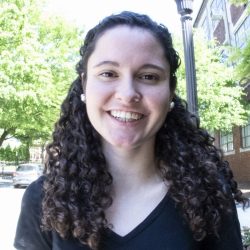 |
| Myra Lattimore |
Myra Lattimore, B.S. AE
What is your next adventure?
Over the summer, I'll be interning at JPL doing computer-aided engineering. In the fall, I'll start my graduate program at ASDL, probably continuing work on model-based systems engineering with [Dr.] Russell Peak.
What about your next adventure are you most looking forward to?
I'm excited to be going to graduate school because there's so much to learn. And, while you learn a lot in undergraduate school, there always comes a point where the professor says 'but we cover that in graduate school.' I want to get beyond that point.
Did you have any previous co-op, internship, or research experience in this area?
Definitely research. I've been fortunate, getting the chance to work in the ASDL and the HPEPL. I've gotten invaluable experience that you just can't get elsewhere. Sophomore year I started looking for opportunities, because, really, that's what Georgia Tech is known for - research. In the ASDL I learned how to use SysML, a language that's used at NASA to model payload adapters for the SLS. I really enjoyed it, but I didn't want to just focus on software. In [AE] 1601, we had a project that focused on different types of propulsion, and I knew that the High Powered Electric Propulsion Lab was doing some great work, so I emailed the professor [Mitchell Walker] and told him I was looking for some hands-on research. He looked at my resume, asked me what I wanted to get from HPEPL, and, I guess because my grades were good, he gave me the chance to work there. Since then, I've worked on magnito hydro dynamics [MHD] to extract power from the exhaust that's generated from a rocket, and I've help develop a new plasma antenna that's more effective at generating low frequency signals for communications. After junior year, I was able to get an internship at JPL, developing documentation for best practices in modeling using SysML. As it turns out, they were looking for interns who know that language, so they came to ASDL looking because they knew that ASDL was teaching that.
Before I got to JPL, I told myself something that I still tell myself: "Don't be complacent. You are working in a lab where you are seeing people work on the Mars Rover every day. It's truly history in the making." It's important to reflect on how exciting those things are.
How did your educational experience at Georgia Tech help you to achieve your goal?
I think one of the greatest things is, I grew up in a small town -- one where I still know the names of everyone who graduated with me -- so when I came to Georgia Tech, a huge university, there was a variety of different people going different places and using different paths. What I began to see fairly quickly was that there is more than one way to get to a successful place, and sometimes if you fail in one area you'll be opened up to succeed elsewhere. I applied to Georgia Tech with zero intention of coming here. I was set on attending one of two schools that are closer to home [Pennsylvania]. But I didn't get into those schools, and it has worked out so well. I had been set on one path, but I ended up having to succeed on another one. Along the way, that story has repeated itself again and again.
What advice would you give to an underclassman who would like to follow the same path?
You need to ask for what you want because, sometimes, getting it is as simple as asking. I got invited to do research at ASDL because I'd seen a talk by [research engineer] Russell Peak and it got me curious. So I emailed him and asked to join his group. At the time, it was daunting, but if I hadn't asked, I'd never have been invited. The other thing I'd say is: a lot of times at Tech you can get concerned about whether your belong. Am I good enough? Will I fail? But you are better off remembering that if you are curious and motivated you already have two skills that smart people value. You can't teach those things. And you can always improve on what you know: people are willing to help you if you are curious and motivated.
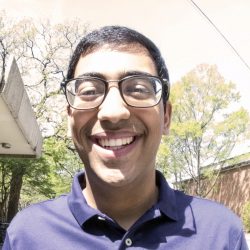 |
| Swapnil R. Pujari |
Swapnil R. Pujari, M.S. AE
What is your next adventure?
I'll be working for Boeing as a systems engineer in their Satellite Development Center. I don't know what project, yet, but I do know I'll be moving to L.A.
What about your next adventure are you most looking forward to?
I'm most excited that I'll get to work on satellites. That's why I got my master's degree. After I received my undergrad, I'd been offered a job doing CAD and structures. I have nothing against that, but I want to actively work on something that goes to space. The fact that I got to do systems engineering at Tech meant that I got to touch a lot of areas, so I was ready for this. I'm so excited about it that it doesn't even feel like a job.
Did you have any previous co-op, internship, or research experience in this area?
As an undergraduate I did two internships, at Gulfstream in Savannah and the Harris Corp in Melbourne, Florida. At Gulfstream I did finite element modeling and structural analysis. At Harris, I did CAD work and model designs for space reflectors and antennae. Research-wise, I was involved with the Prox-1 cubesat for more than four years. I started out working on CAD, making sure all of the components fit together. My senior year, I was elevated to structures lead, and there were seven or eight people under me. That taught me a lot about team management, identifying and using other people's strengths and weaknesses, and, most of all, accepting that I couldn't do it all myself. In graduate school, I was asked [by Prof. Dave Spencer, the P-I] to stay on the project as the chief systems engineer.
As a grad student, I had two internships, both at JPL. They involved a little bit of CAD, and a lot of systems engineering. One was a concept study of the Next Mars Orbiter or NEMO where we did a lot of trade-off studies to determine what configurations would work best. Because I wrote a lot of code for this one, someone asked me to join another team that was designing a low-cost Mars Rover -- we called it Fetch Rover. Essentially, then, I was working on two projects, and the work was hard. There were weekly evaluation meetings with higher-up administrators. But I felt like I was working on something that was relevant and I wouldn't have dropped either one. It was a great experience.
How did your educational experience at Georgia Tech help you to achieve your goal?
When I first got to Georgia Tech, I didn't know if I wanted to study aircraft or spacecraft. That was part of my exploration, as an undergraduate, and it landed me a job on a satellite (Prox -1] that opened up opportunities I didn't even imagine. Suddenly, I was working on a satellite that, in a couple of years, could end up in space. A couple years after that, I was helping others to work on the same project, as the chief systems engineer. It's just something I'd never have imagined. But when I went on interviews, employers saw it. They wanted to take advantage of my experience because they knew they wouldn't have to bring me up to speed. I could continue along the path I'd already started at Tech.
What advice would you give to an underclassman who would like to follow the same path?
I'd have two pieces of advice. First, as an undergraduate, learn the fundamentals and get involved in research if you can. Drop any assumptions you might have about what you will do. Your undergraduate degree is only a license to learn so learn as much as you can. Industry is where you'll take off the training wheels and pay your dues.
As a graduate student: graduate school begins to set you apart, but in no way are you an expert. Remember that you are here because you wanted to be here and take full advantage of everything you can find in the research and the classes.
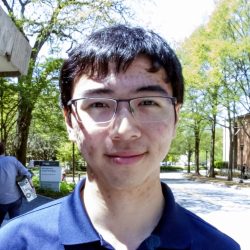 |
| Scott Yue Guan |
"Scott" Yue Guan, B.S. AE
What is your next adventure?
I will be staying at Georgia Tech to study under Prof. [Panagiotis] Tsiotras. We'll be working on the more theoretical end of the spectrum in autonomy -- multi-agent game theory. I'm still reading papers about it right now.
What about your next adventure are you most looking forward to?
I'm excited because I'll have more free time to do research. I'll have the chance to synthesize what I've been studying, to push the boundaries, even. As an undergraduate, I've been a math minor, and I've seen some beautiful theorems. Now I'll actually have a chance to develop some interesting algorithms.
Did you have any previous co-op, internship, or research experience in this area?
You are always trying to figure out where you will land on the spectrum between theoretical and experimental. First, I worked in the [Ben T. Zinn] combustion lab, where we tested a new generation combustion engine.My second year, I finally realized what I wanted to do. I worked with Dr. Clarke, doing CFD for an air speed instrumentation fault detection project. During one summer I did a research internship at the Technical University of Munich where I worked on CFD simulation of geo axial helicopter blades. It was a really interesting work environment, totally different. It was hard for me to figure out what they were expecting. Sometimes, I was super-independent because I didn't want to bother them with questions that would waste their time. Then there were times where I would have wasted five hours on the wrong task if I hadn't asked. I figured it out, and it was a good lesson.
This past year, I worked with Prof. Saleh looking at high thru-put satellites. New high thru-put satellites are optimized to provide data services and uplinks that address individual customized needs. I worked with him on the intro to a paper that looked at their capabilities and potential. We made suggestions. We also worked on a more theoretical cost model for the satellites.
How did your educational experience at Georgia Tech help you to achieve your goal?
The professors. They are world-class. And they are really committed to teaching. Dr. Saleh was all always well-prepared and ready to motivate you to do your best. He was the best-ever mentor. Dr. Clarke was always there for advice. At one point I told him that my computer couldn't handle CFD and he basically bought me a computer with the right CPU and cards. I thought this was all normal until I went to Munich. It wasn't. Georgia Tech has such great software packages available to its students. Munich did not. So, when I was working over there, I just logged onto my Georgia Tech account and used our software.
What advice would you give to an underclassman who would like to follow the same path?
That's a very philosophical question. Any kind of advice I give now you'll eventually regret. If I tell you to stick to your research above all else, and that's what you do, 50 years later you might regret not having more fun. I'd say the best advice is to seek balance, but know that you might not succeed in that. For myself, personally, I prefer to regret -- not enjoy -- my college years, in terms of the fun that I might miss. If you work hard for many years to develop a body of research, your hard work gave you the foundation for having something to regret. It gave you a career, something to support you. At Tech, to do your homework, you have to sacrifice free time and the things you might do with it, like hiking or sports. For me, I didn't have the time to play clarinet because I chose to do research. It's a price that I decided to pay. Is that right? Who knows? Ultimately, after I finish my degrees, I will probably go back to to industry because my goal has always been to be an engineer, to apply my knowledge to physical systems. And industry feels like it might be a little bit of a break because you just work eight to 10 hours a day. At Tech, there's always another equation.
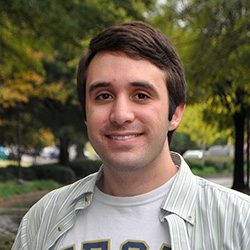 |
| Seth Gordon |
Seth Gordon, Ph.D. AE
What is your next adventure?
I've just been accepted into the Northrop Grumman Future Technical Leaders program, which means I will be working three one-year rotations as a systems engineer at different branches of the company. We're still discussing what my first assignment will be, but I’m hoping to start out in Baltimore.
What about your next adventure are you most looking forward to?
It will be really nice to have a real paycheck and regular hours. Just being a normal person - not a grad student. And I'm from the D.C. area so it will be nice to be close to family and friends. Also, something I've found in grad school is that I've always done my best work when someone says 'here's my problem - solve it.' I'll work hard to find a clever, well-engineered solution. I'm a fixer who finds different answers along the way, rather than waxing philosophical about the process. I'm looking forward to all of the work and brainstorming, but there's an endpoint, too. I like that.
Did you have any previous co-op, internship, or research experience in this area?
My final two summers at Princeton, I did internships at SpaceX in avionics mechanical design. The summer of 2016, I did an internship at Raytheon where I did a lot of coding work for simulating missile behavior. When I received the NDSEG [National Defense Science and Engineering Graduate Fellowship] I had a chance to pick my research. That's when I started my ASDL research on ballistic missile defense for Navy ships. The goal was to develop a simpler model for checking the numbers and seeing what's going on. I also helped do trade-off studies, develop missile models, and work on the simulated 'battle manager.’ Also, my Grand Challenge project was to design a long-range air-to-air missile. My final two years as a grad student I worked on a GTRI-sponsored project for low-fidelity, high-efficiency simulation of radars. I worked to process big data sets generated by radar signals interacting with actual terrain.
How did your educational experience at Georgia Tech help you to achieve your goal?
The biggest thing is doing applied research and interacting with industry. My biggest weakness coming out of my undergraduate education was that I didn't know how it all worked together. At Tech -- and in particular at ASDL -- I would run into industry experts all the time and be able to learn from them and their experiences.
What advice would you give to an underclassman who would like to follow the same path?
I think Tech was absolutely amazing for me and I have no regrets. My recommendation for incoming graduate students would be to not be afraid to go outside your comfort zone in research or in classwork. I took hard courses and I'm don’t regret them, even stats and probability where I got the worst grade of my career. I also did the Sam Nunn Security Fellowship program. The goal is to help bridge the engineering/policy divide and it did just that. I got introduced to a non-partisan branch of government that does day-to-day analysis and remains impartial. I was taught by someone who does war analysis in the Pentagon. We met Vice President Pence's national security advisor and we gave a presentation before the Joint Special Ops University in Tampa. The Sam Nunn School is one of the reasons I chose Tech, and I think it will remain a fantastic resource for me going forward.
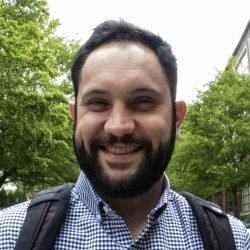 |
| Robert Bauman |
Robert Bauman, M.S. AE
What is your next adventure?
I am returning to Ridgecrest, California, where I will work as an aerodynamic analyst for the Weapons Division of the Naval Air Warfare Center (NAWC). Under the terms of my SMART fellowship, I owe them two years. My work will focus on the external aerodynamics of of missiles and bombs. Our team does performance analyses for anyone who comes up with a new concept.
What about your next adventure are you most looking forward to?
Other than starting out a new life with my wife - I met her here - it'll be great to get back to the high desert. It's the desert surrounded by mountains, with pristine eastern alpines.
Did you have any previous co-op, internship, or research experience in this area?
I did CFD at NAWC for five years before I got to Tech, and that helped me to zero in on what I wanted to do here. My research at Tech with Dr. Smith has been on a high-fidelity CFD project related to an interesting phenomenon experienced by missles at high angles of attack. Under the terms of my SMART fellowship and my arrangement with NAWC, I was required to work for NAWC during my summers and any other time I was not in school. So I was back in California a lot, designing research that was coordinated with my boss and my advisor. I had the opportunity to learn a different software tool there -- and I got to test it out at Tech. It was very practical.
How did your educational experience at Georgia Tech help you to achieve your goal?
The biggest advantage to going back to school while you are working is not necessarily the specific things you learn. Because even when you learn something well in a book, it doesn't always translate in the world. The thing I got from Tech was the confidence of knowing that, when I was stuck on a problem, I could pick up a textbook -- or two or three -- and figure it out. I was more confident that I could break it down and put it back together. And I could see better, how it fit into the grand scheme.
What advice would you give to an underclassman who would like to follow the same path?
Well, first of all, grad school wasn't right for me right away. I spent five years at the China Lake Naval Weapon Center in California before I got here. When I did get here, coming in self-funded, through the SMART fellowship, was great. More students should consider applying for a SMART fellowship. Grad school is hard for a lot of reasons, but funding should not be one of them. This fellowship doesn't just give you the funding; it gives you summer internships that turn into a job.
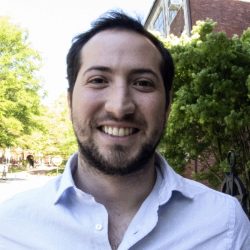 |
| Alfredo Valverde |
Alfredo Valverde, Ph.D. AE
What is your next adventure?
Immediately after graduation, I will go on a trip to Italy with my wife and my mother. In August I will begin my job as a guidance and control engineer within the Control Analysis Group at JPL.
What about your next adventure are you most looking forward to?
The most important thing is spending more time with my family...and traveling. I didn't have as much time for either when I was in graduate school, so taking some time to travel with my family, now, while I am young, is great. As far as my job goes, I am looking forward to taking what I know and putting it to the test. All of the knowledge I've accumulated after eight years of study -- based on the internships -- it looks good. But now that I will be the one in charge - not the grad student intern -- and I can't wait to meet that challenge.
Did you have any previous co-op, internship, or research experience in this area?
I came to Tech as a foreign national, from Costa Rica. Internships would be very hard, maybe impossible for me, so, from the start - from day zero minus one - I capitalized on what I could do: research. I emailed professors before I got here. I ended up working a lot in the combustion lab for the first five years I was here, going from project to project. I even worked on the Prox-1 satellite. There was a lot of trial and error. I learned that the first time you try to build something you will not necessarily be successful. In fact, usually there will be errors that you need to correct. That's where you learn. With academic maturity came more engineering savvy, and I began to see more of what I wanted to do. By the time I started my master's program, I knew I wanted to work on dynamics and control. When Dr. Tsiotras asked me if I liked math, I knew I'd found the right advisor. He wants to succeed and the only way that would happen is if I liked math. He was working on dual quaternions, a pose presentation tool that allows for really beautiful math results in spacecraft controls. It captivated me to see such a clear link between math and engineering.
At some point, I got married, and that opened up my internship possibilities. I did three internships at JPL focusing on dynamic modeling in controls.
How did your educational experience at Georgia Tech help you to achieve your goal?
The answer is obvious: Georgia Tech got me to the place where I am. The professors are able to identify students who work hard and they take special care to promote them. Five years ago, I probably wouldn't have been noticed by JPL. But Prof. Braun pinpointed my skills and accomplishments to get me an interview at JPL. And as I interned at JPL, my advisor also got grants to work there, so we were able to collaborate in the summer. The more I worked in the labs at Tech, the more potential there was for other collaborations, outside labs. JPL took an interest in me because of the work I'd already done.
What advice would you give to an underclassman who would like to follow the same path?
The steps I've taken have very clearly been successful in landing me a dream job. But there's always room to improve. I wish I'd taken more computer science courses, more ECE courses. Still, you will learn a lot from being part of a research collaboration. An aerospace engineer is not just someone who builds something that flies. It's someone who knows how to build something that works well. To make that happen, you need to work with electrical engineers, industrial engineers, computer scientists...it's a lesson that is emphasized in Senior Design - you need to work as a team -- but it's easy to lose perspective if you are only taking aerospace-specific classes. And the concepts we learn in these classes are not just for AE. You can apply concepts in control theory to other areas. IT's a mathematics-based framework that can be applied to any field.
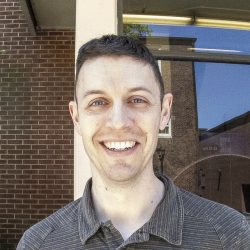 |
| Robert "Bob" Walters |
Robert "Bob" Walters, M.S. AE
What is your next adventure?
I plan to remain at Georgia Tech where I will be working as a research engineer at the rotorcraft simulation lab where I've been working for the last two years. As a research engineer I'll continue working on controls with Dr. Prasad and I will also pick up some more perspective in human factors by working with Dr. Feigh. This was my number one choice, after finishing my master's program, because it will allow me to get a Ph.D. As a non-traditional grad student - I have a wife, one child, and another on the way -- I needed some way to support my family while I study. The RE job will allow me to do both, even if I have to study for quals with a newborn baby.
What about your next adventure are you most looking forward to?
I'm most excited about being able to work in the rotorcraft simulation lab that I've been building, with Dr. Prasad, for the last two years. If I'd gone into industry, I'd never have had the chance to see this lab used by the Navy Test Pilots who are coming in to work with it this summer. And I'd never have seen it fully used by the other units in the AE School. To see my colleagues use it will be really fun.
Did you have any previous co-op, internship, or research experience in this area?
After I graduated [from West Point] I served for several years in the Army where I was given the opportunity to work on the UH 60 - the Black Hawk - and to go to Aviation Flight School. Flight school gave me a great opportunity to master skills and knowledge that have been very relevant to what I am doing now: things like basic airmanship, using the radio, flight planning, instrument flying, night flying, flying without a GPS. At Tech, I have been devoted to the design and building of the flight simulation lab with Dr. Prasad. It has spun off some research projects, like the Navy's Task 10 that we are doing through the Vertical Lift Research Center of Excellence (VLRCOE). We're working on queing smart trajectory optimization for shipboard landings.
How did your educational experience at Georgia Tech help you to achieve your goal?
The connections that the faculty maintain are incredible. After I left active duty, I was interviewing with an aerospace firm and the guy who interviewed me was a Georgia Tech grad. He said he thought my military background was excellent, but that, after eight-plus years out of school, my engineering skills might have needed sharpening. He suggested I go to graduate school - to Georgia Tech. I said well, I'd like to but I have a wife and a child to feed. Even with the GI Bill, it was going to be tough. He didn't let up. He said that I could probably get a GRA (research assistantship) that would pay me while I was in school. And then he called Dr. Schrage and Dr. Prasad so I could talk to them directly. With all of my experience as a pilot and some engineering background, it was the support I got from the faculty that helped me to transition.
What advice would you give to an underclassman who would like to follow the same path?
I think the thing that sets Georgia Tech apart from other schools is its faculty. The faculty network with everybody in the industry. Those connections make things happen in their labs, their research, and for their students. When we started building the simulation lab, they had a connection with Al Brand [an AE alum] at Bell Flight, and through that connection, we got a cab for the simulator. If you are looking for an internship or expert advice for your career, their connections will give you an edge.